Last Updated on June 9, 2025 by Ewen Finser
Selling a business is no small thing. It doesn’t matter if you’re hoping to make $50,000 or $50 million: Aiming for an exit is a big deal, and working with a business broker or selling on a marketplace is one way to achieve that.
If you go the broker or marketplace route ⏤ or both, if you want to hedge your bets ⏤ then you’ve got to find the best broker or marketplace for you.
It’s important ⏤ and will save you a lot of stress, headaches, time, and money ⏤ that you work with a team or someone who understands your business, and proactively wants to get the best deal possible.
Are you Ready to Sell Your Business?
Firstly, before you approach brokers or M&A marketplaces, make sure you are ready to sell. Selling takes time and work. It’s something you’ve got to want to do.
💡 Pro tip: Expect this process to take time. From start to finish, it could take anywhere from a few months to a year to get everything signed and money in your bank.
Selling could be an act of desperation (even businesses in trouble can sell, to the right buyer), or perhaps this is the last stage in a long and well-executed plan to exit a business you’ve worked on for years.
What do I Need to Help Me Sell a Business?
Before you even consider emailing a broker, have ready the following, or check how much time it will take to have the following prepared:
- A realistic valuation: Could be based on Discounted cash flow (DCF) or seller discretionary earnings (SDE).
- Ideally, an independent valuation because you’ll need one if you’ve applied for:
A (pre-qualified) seller-financed SBA-guaranteed loan. To get an SBA-backed loan, you normally need the following:- Personal credit score above 680
- Profitable business with a healthy cash flow
- Business debt-to-earnings ratio of 1.25:1 or better.
- Ideally, the business needs to be profitable and you need all of your financials ready: Cashflow, revenues, P&L (Profit & Loss), and EBITDA.
- Have legal documents prepared, such as NDAs, and:
- A Confidential Information Memorandum (CIM).
- A Letter of Intent (LOI), for when the conversation is ready to get serious.
- A list of intellectual property (IP), assets, and logins to relevant accounts a buyer might want to see (your analytics, payment accounts, like Stripe, etc.)
- Ideas for how a future buyer would grow the business. For buyers, they’re looking at the potential of this business as much as its reliability as an asset.
Now that that’s ready, or in the process of being made ready, it’s time to get searching for ways to sell.
When it comes to selling, you’ve got 3 main options:
- Find the right broker or marketplace;
- Try and sell it yourself, privately: approach potential buyers in your network;
- Try and sell it yourself publicly: Using your personal and business social channels, newsletter(s), podcasts, or any other way you can think of to find a buyer.
We’ll cover the second and third options in another article. For now, let’s discuss the pros and cons of 7 well-known brokers and marketplaces.
Why Go With a Business Broker or Marketplace?
As with every major business decision, there are pros and cons to going through a marketplace or business broker.
Pros:
- You don’t have to DIY the sale process: Someone else can tackle a lot of the promotional and vetting aspects. Depending on which route you go, of course. Some platforms and brokers take care of everything, whereas others are more like marketing channels where you’ve got to pay to gain visibility.
- You’ve got a much better chance of meeting a potential buyer either via the broker or marketplace route than doing it yourself (DIY).
- Serious buyers are often easily identifiable, especially if they’ve been vetted by a broker.
- Serious buyers will be ready to go through due diligence, have a real interest in buying, and have cash ready.
- Serious buyers will have a post-acquisition growth plan. Make sure to ask them about it. That’s the advantage of working with brokers or marketplaces to find a buyer; you’re more likely to quickly engage with someone who wants to do the deal as much as you.
💡 Pro tip: Brokers do take commission. You could be looking at 10 – 20% of your business sale value, so make sure it’s worth enough to share some of what you’ll get.
But . . . a good broker will actively help you get a higher sale value, making them worth their weight in gold!
Cons:
- You no longer control the process: It’s in the hands of someone else, their team, or a platform with its own algorithms.
- You might get loads of people who are “interested” but not, at the end of the day, actually serious about buying.
- You risk losing some competitive advantage to competitors who want to take a look at how you do things (especially if you go via a marketplace).
- It takes up a lot of time to filter through potentially 100s of messages from “interested” buyers.
- It could be a distraction from running the business, so make sure you’ve got the mental bandwidth and processes or people in-place to run things in your absence. Don’t sacrifice revenue in the short-term because that could impact your valuation and what you get from the sale.
With all of that in mind, let’s look at 7 options for the best brokers and marketplaces worth considering when you sell.
7 Best Business Broker and Marketplace Options
1. Quiet Light

Quiet Light is a brokerage with a team who have “Been There, Done That.”
Quiet Light promises radical honesty, even if it doesn’t benefit them. They have perfected the art of valuing and selling businesses to maximize the sale value.
Based on their processes, network of qualified buyers, and approach to selling, they promise that 85% of sales happen within 90 days.
Most sales are listed online, so in that sense, they operate like a platform, but one whereby every business has been thoroughly checked and vetted before it’s listed. The only downside is they don’t say how much they charge, or what percentage they take from the sale; but I’m sure they will if you ask.
Even if you aren’t ready to sell, or aren’t sure who you want to sell with, you can have a free no obligation chat with one of the team members to see what your business could be worth, and if it’s the right time to sell.
2. BizBuySell
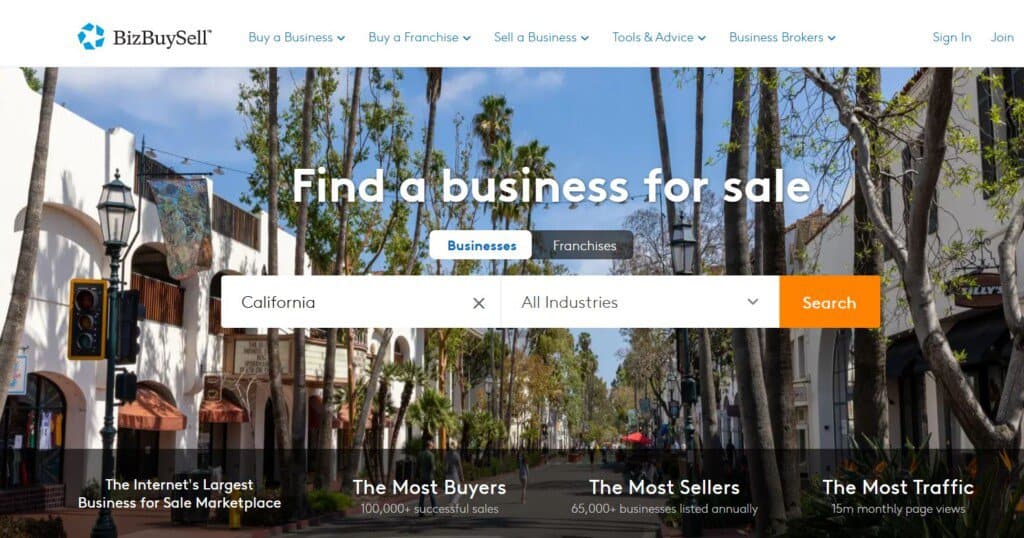
BizBuySell is one of the largest online marketplaces for buying and selling businesses around.
100K+ businesses have been sold on this platform, and 65K+ businesses get listed on it every year. It’s got 15 monthly page views.
Which sounds impressive, but one of the issues is that there are too many tire kickers, and not enough serious buyers. It’s also very pay-to-play to get any kind of decent leads, and known for having very poor customer service.
3. Flippa
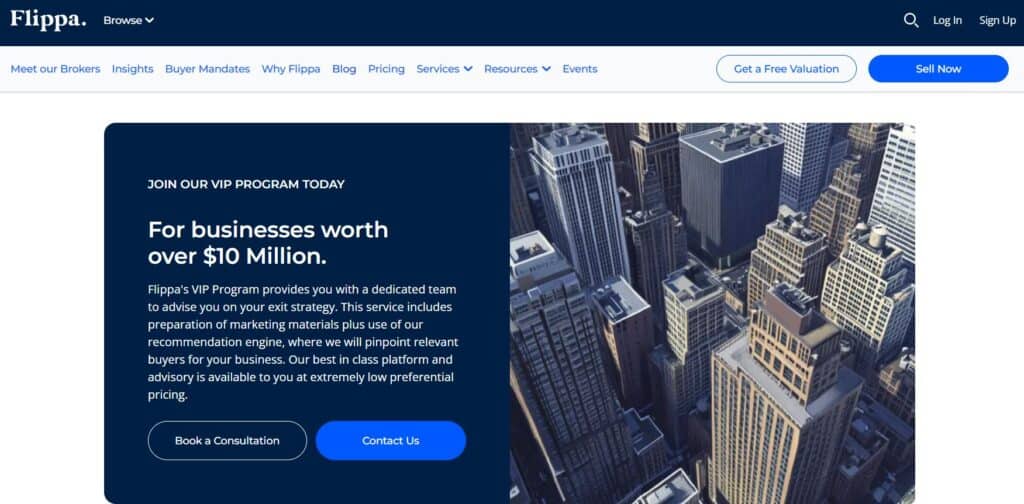
Flippa is the major competitor to BizBuySell, also claiming over 100,000 deals done since it was founded.
The numbers look good, but there’s no mention of the $ amount of those deals. It’s also very much a pay-to-play platform. If you don’t put money in, you won’t get seen by potential buyers.
If you’re aiming to sell for $1M+ then you get full M&A broker support, and you pay the premium for that service. It’s more expensive to list than other M&A platforms: If it takes 6 months to sell for $1M with the M&A broker package, it’s going to cost $85,394 via Flippa.
4. Acquire
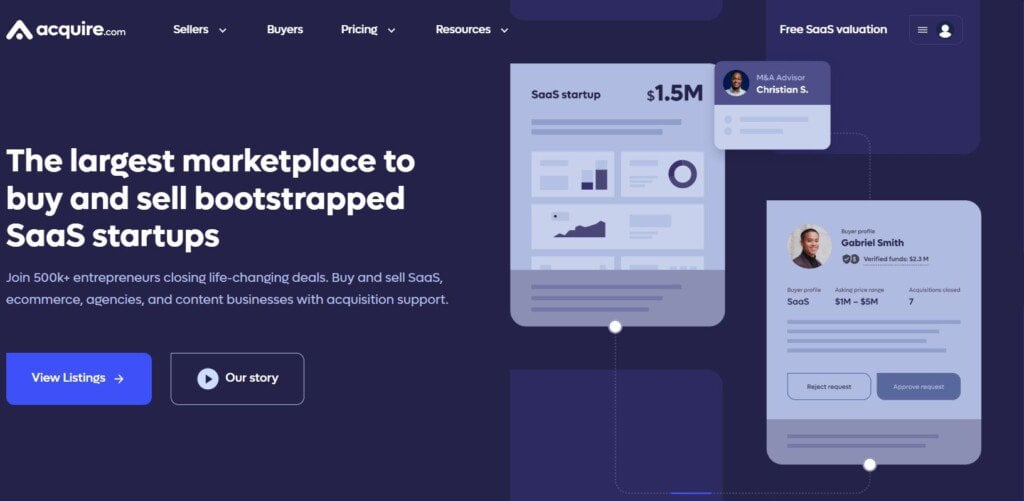
Acquire went niche when other platforms have stuck with being broad and deep. If you’re a SaaS founder, then this could be an ideal platform for selling your business.
It’s more automated than other platforms, and everything is included in the service. Their team manages the end-to-end process as part of the package.
But, if you look more closely at the numbers: $500M in deal volumes, spread over 2000 deals, which means the average deal on Acquire is worth $250K.
It’s not pay-to-play, and it’s also cheaper than other platforms. So, if it takes 6 months to sell for $1M it’s going to cost $70,300 via Acquire (around $13K cheaper than Flippa).
5. BusinessForSale.com
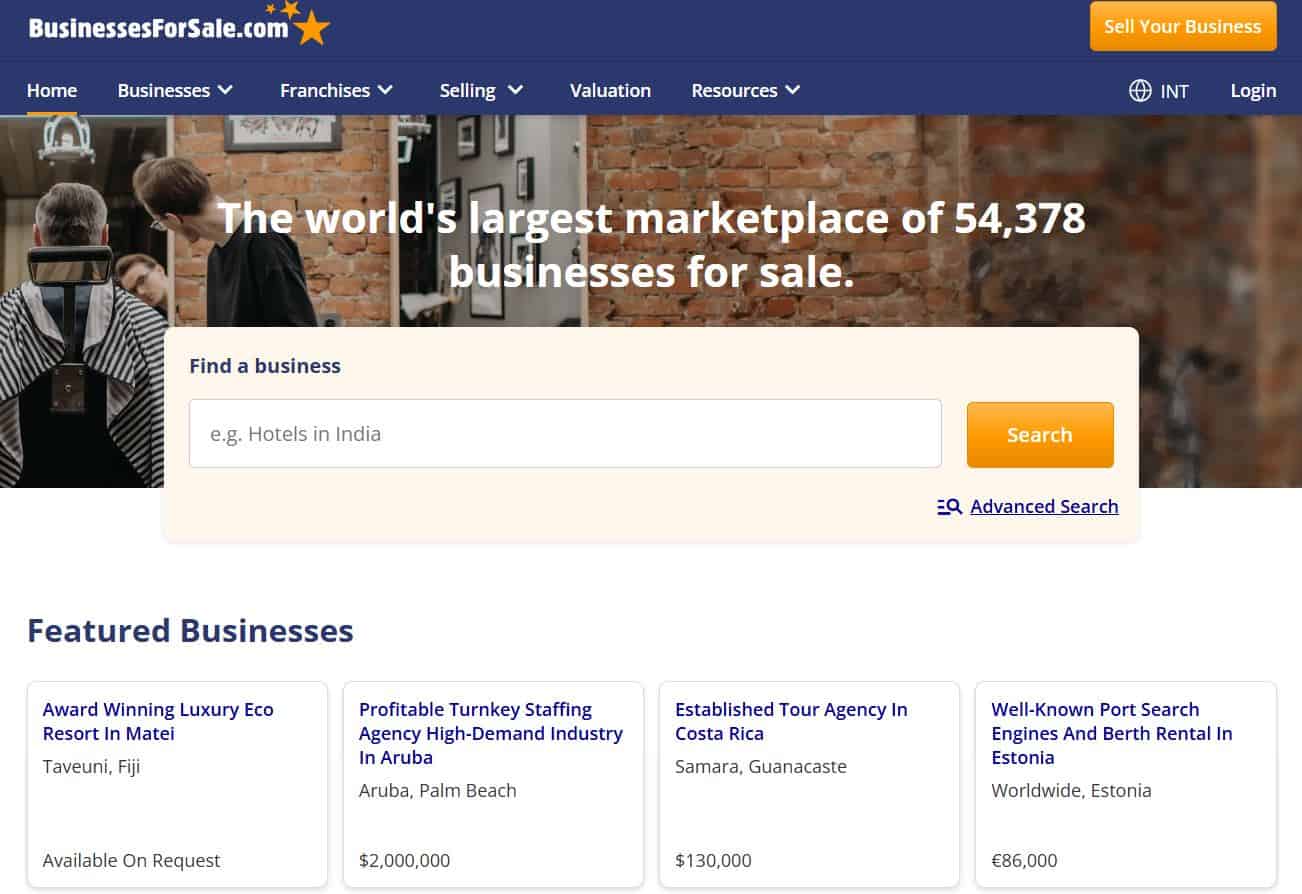
BusinessesForSale.com is probably the oldest marketplace, having been around since the early-days of Web 1.0, before the dot-com boom. Hence why it’s probably more popular for selling physical than digital businesses.
It’s a very diverse platform. Sellers can list almost anything, from vineyards to islands, real estate, and franchises.
They are more affordable than most options. You can even try the market for free for 20 days, and after that, the pricing ranges from $199 to $399, depending on whether you choose a 1, 3, or 6-month package (billed upfront). However, keep in mind that they are just a listing platform and don’t offer the additional services that newer platforms provide.
BusinessesForSale.com isn’t ideal for selling online businesses: SaaS, eCommerce, websites, etc., aren’t their most popular categories.
6. Empire Flippers
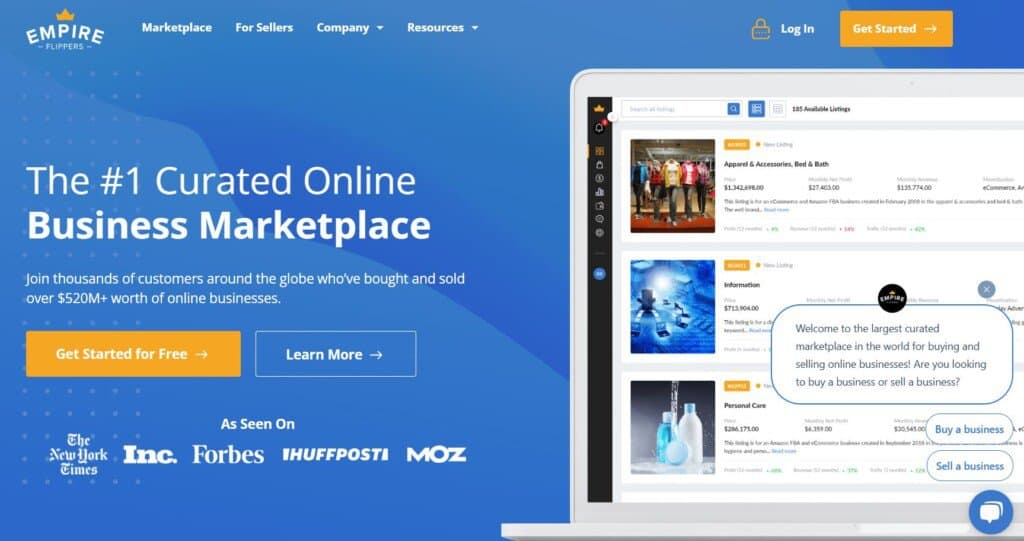
Empire Flippers describes itself as “the largest curated marketplace in the world for buying and selling online businesses!”
It boasts over $520 million worth of businesses sold. Unlike other platforms, EF has a scorecard for average sale multiples, based on data from the “net profit of the trailing twelve months (TTM)”.
This is currently showing multiples of 39.4X for $1M+ businesses and even 12.8X for distressed businesses. Listings show a wide range of data points including traffic and customer ratings.
EF acts more like a broker than a marketplace, so although they don’t charge listing fees, they do charge 15% commission (or 8% between $700K and $5M, with a further reduction after that). Unfortunately, getting listed can take a while: weeks or even months.
It’s not great for anyone expecting to sell for less than $100K. In most cases, EF doesn’t bother listing in that price range.
7. Onfolio
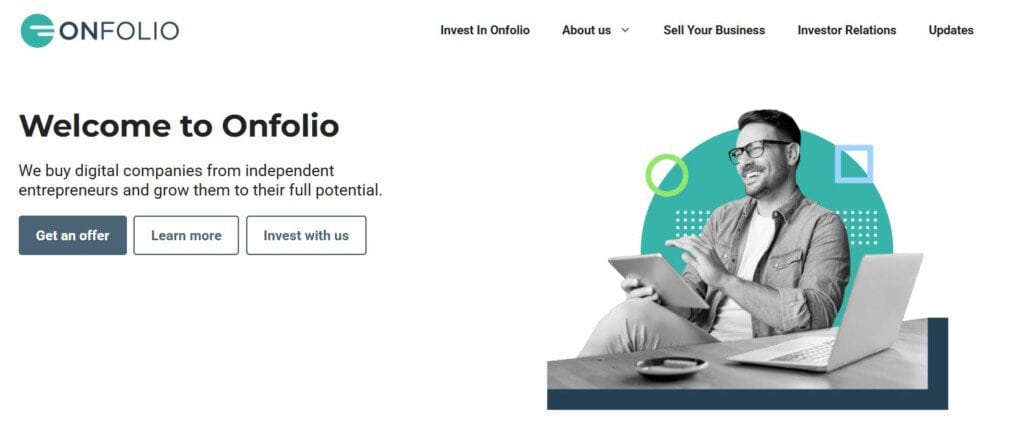
Onfolio is a Nasdaq-listed business that buys other businesses. Its focus for the last few years is digital marketing agencies, and they’re currently raising more money to keep acquisitions rolling forward.
You need to be doing $500K+ annual profit to go through them, but if you fit their criteria, they claim you could get an offer within 14 days and payment after due diligence.
Onfolio isn’t a broker, but if they like the look of your business but you don’t meet their criteria, they will refer you to a broker that they trust.
However, due diligence and the post-acquisition plan for your business can take a while. So, don’t expect to get paid for a few months.
Is it Worth Selling Through a Broker or Marketplace?
In almost every way ⏤ unless you’ve got 2 or 3 genuinely interested buyers in your network lined-up and ready to talk seriously about this ⏤ the marketplace or broker route is the right one for most business owners.
However, it’s only right for you if:
- It’s the right time for you;
- You are confident the business is sale-ready;
- You go with the right marketplace or broker for your business;
- You’ve factored in the cost and extra work beforehand;
- You’ve got everything ready (or can do it easily enough) before a serious buyer wants to talk about due diligence.
Out of these options, Quiet Light stands out for the honest advice and team’s expertise, even if your business isn’t sale-ready, they can tell you what’s needed to get it ready for a buyer.
If you’re selling a SaaS, Acquire looks like a good choice, and for agencies: Onfolio. For physical businesses, I’d go with BusinessesForSale.com.

